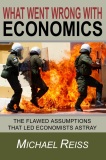Right now, most people seem to be worrying about deflation while others (Notably, Peter Schiff) are worrying about hyperinflation. The arguments go like this:
Deflation: People have so little "confidence" in the future right now that they are unwilling to spend their money. This causes retailers to lower their prices to tempt the reluctant customers to buy their stuff.
Hyperinflation: The central banks are being forced to print so much money (for a variety of reasons) that the purchasing power of each of the dollars or pounds can only reduce.
So far, in reality, what we seem to be observing is neither (neither remarkably high nor low)... but how can that be if the central banks are printing so much money? The answer is tied to the money creation mechanism, so called "fractional reserve banking". If you don't know exactly what this term means, then please watch this brilliant cartoon right now. Once you understand this mechanism you should be able to see that, if the overall flow of money(with respect to banks) is predominantly a process of the banks customers paying back money the had borrowed earlier (as opposed to taking out new loans), then there will be a large amount of money disappearing out of existence.... by the way, if at this point you think that the idea of money disappearing out of existence is crazy, then either you didn't watch the cartoon, or you never fully understood fractional reserve banking.
At the moment, the forced reduction of prices due to lack of confidence combined with the disappearing out of existence of money, seems to be a larger effect than the (otherwise inflationary) process of printing money.
Its not obvious to me what's going to happen in the long run. But I'm writing this blog entry because I haven't seen reports elsewhere discussing the disappearing out of existence of money when people are paying back more than they are taking on new borrowings. Did Peter Schiff miss it... or did I miss something? Please comment on this and tell me!
Saturday, 7 March 2009
Subscribe to:
Post Comments (Atom)




Deflation is a decrease in the money supply. Our money supply is increasing. Check out shadowstats.com for an accurate picture, but even the governments own manipulated statistics show they are growing the money supply. Plus in March 2009 the US announced the Fed is going to start purchasing treasury bonds (they will print money in order to buy IOUs!). Totally insane. The money supply is increasing, which is the definition of inflation.
ReplyDeleteAlso, even if banks were absorbing more money than they were distributing, the federal government is spending billions, even one TRILLION dollars that it DOES NOT HAVE, by going into debt. This is inflationary.
We will see rising prices. Some people make the claim that prices will fall. Well, prices of certain overpriced assets like housing, which were in an irrational bubble, will return to a normal level, but aggregate prices of all goods and services will rise. Peter Schiff is right.
The main thing keeping the American economy from totally imploding is that the US is able to export its debt to foreigners, since the dollar has enjoyed status as the world's reserve currency. Well, today China announced its plans to create a competing world currency to supplant the dollar. We are in serious trouble.